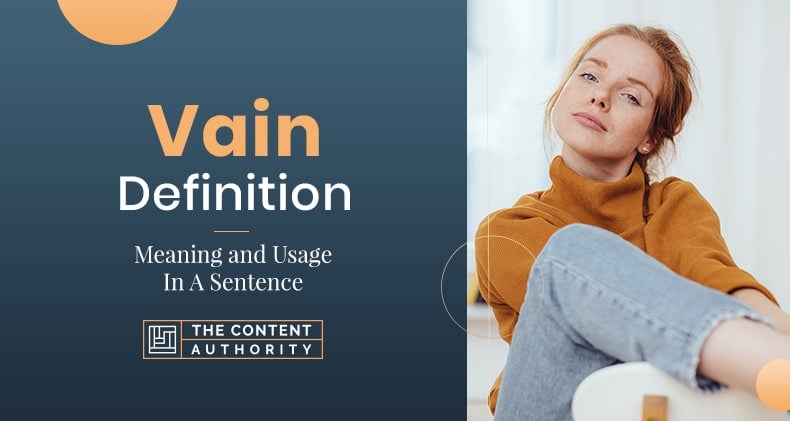Have you been wondering what the best vain definition is? Many people believe that vain means to be very proud of oneself, but this is not always the case. While the word typically has a negative connotation, it can be used in various ways. You need to understand the term, its meaning, and its usage in different sentences.
Vain means ‘concerning or influenced by extreme pride in one’s appearance, qualities, achievements, etc.’ In other words, it refers to those who constantly flaunt their personal attributes as if they are superior to everyone else. Use the word where there are ‘self-centred’ attributes.
This blog post will explore the different meanings and usage examples of this tricky word. We’ll also provide tips on using it correctly in your own writing!

What Is the Definition of Vain?
The true definition of this word is “marked by or arising from a lack of modesty or humility.” Note these two definitions: (1) vain (adj) – characterized by or stemming from excessive pride in one’s abilities and achievements. (2) Vain (noun) – a person who is excessively concerned about his or her appearance.
The word “vain” has several dictionary definitions. However, “vain” most common definition is the state being overly concerned with one’s appearance, quality, or worth. Simply put, someone who is vain is often too impressed with themselves and their accomplishments.
For instance, if someone thinks they look beautiful, but others say no, this would be considered vain. A vain person will often take selfies because they are obsessed with how they look. They are very concerned about their appearance.
The common synonyms of vain include:
- Arrogant
- Proud
- Self-complacent
- Trivial
- Fruitless
The common antonyms of vain include:
- Useful
- Humble
What Is the Meaning of Vain?
Vain can also mean futile; without effect. Something that doesn’t turn out successful. It’s vain when you promise something just for the sake.
We mean that if someone says they will accomplish something and they do not, that is vain. For example, if you say you will complete a task tomorrow and you don’t, it would be considered vain because the job was supposed to be done the next day.
The word also means without any worth or real value. Someone or something without value is vain. An example of vain in this case is trying to escape from school only to be given a mid-break the next day.
Vain can also mean irrelevant or improper. Something that you do and you shouldn’t be doing. You might think it’s not essential, but it matters a lot to those around you. For example, it is vain to take God’s word for granted.
How to Use Vain in a Sentence?
The word vain can be used as an adjective, noun, or adverb. In the right context, the word is easy to understand, even by those reading it for the first time.
Adjective
Adjectives modify and describe nouns and pronouns. As an adjective, ‘vain’ describes people obsessed with their looks. Ever heard someone say, “Oh, please, it’s not my fault I look this good.” That is where vain comes in. This sentence makes it even easier for you to understand the word usage: “Every time he gets into the house, he looks in the mirror and flexes his muscles. He is being vain.”
Noun
When used as a noun, it describes something that one might mistake for being essential or valuable but is useless. “I can’t believe you drank three whole sodas this morning. Why do you have to be so vain?”
You can use ‘vain’ as a noun in different forms. Let’s have a look at two words and their relevant examples:
Vanity (noun) – the trait of believing that you are superior to other people; and can only be happy if you get your way.
In a sentence: “It’s no use trying to convince Bernie to take up fencing; she’s just too filled with vanity already.” Or “My kids are too young to understand vanity yet, they will when they get a little older.” Lastly, “He says he wants to be rich and famous because he believes it will make him attractive to women, but I think his vanity is preventing him from seeing how ridiculous he sounds.”
Vainness is also an abstract noun of “vain”. It means a state of being ineffective or useless.
In a sentence: The vainness in his attitude frustrated all the colleagues in the two organizations he worked for.
Adverb
As an adverb, it describes how something happens. Vainly is the main adverb in the word vain, and it means in a futile way or without success.
In a sentence: “Her friends tried to convince her that becoming a model was a bad idea, but she went ahead and did it anyway, vainly assuming that things would work out. We all know how that ended up.”
10 Examples of Vain in a Sentence
Now that you know ‘vain’ definition and meaning, we’ll list some examples to emphasize word usage. That said, let’s take a closer look at ten examples of how to use vain in a sentence. Here we go!
- I’ve never seen a more vain person in my life than Frank!
- Tommy quickly learned that he needed to stop being so vain if he wanted anyone to take him seriously as a musician.
- Whenever Cate looks into the mirror, she always compliments herself on her beauty. It’s so vain!
- She would be a much more likable character if she weren’t so vain and arrogant.
- Her recent promotion has made her even more vain and entitled than ever before.
- He is so vain that he claimed his doctorate was more prestigious than the Nobel Peace Prize.
- After you clean the mirror, remember to dry it completely, or else it will remain sticky! Remember that cleaning a mirror is an easy but vain task.”
- His narcissism and self-centeredness due to his vanity were not as visible when we first met, but now that he has become more successful, it is hard to ignore.
- He thinks that he is the most crucial person in the world. He’s so vain.
- He tried to draw on the mirror with his finger and thought it would stay there forever, but alas! The silly boy had made a vain.
How Do You Spell Vain?
The collect spelling is “vain /veɪn/” The good thing is there’s no disagreement among language experts about the word’s spelling. It’s also easy, even when used in its different forms.

How Do You Pronounce Vain?
The Oxford English Dictionary says the two possible pronunciations are “vayne” and “veen.”
The first pronunciation is similar to how one might say “pain,” which makes sense given its meaning, while the other accent seems to be used more often in British English. Merriam-Webster and Dictionary.com list the same two pronunciations and give preference to “veen.”
Others claim that the correct pronunciation is “veɪn” and “veyn.” Interestingly, people wonder if the pronunciation of this term follows suit with what it means—unpleasantly vain or completely fine. The truth is that isn’t always the case.
Of course, some claim it’s OK to pronounce everything as if you’re in a Shakespeare play, but some language experts disagree with them.
Synonyms Of The Word “Vain”
- Prideful
- Important
- Egoistic
- Important
- Presuming
Antonyms Of The Word “Vain”
- Timid
- Introverted
- Egoless
- Humble
- Modest
How Many Syllables are in Vain?
The word vain has one syllable.
History & Etymology of Vain
Vain is a French adjective that can mean “of no use” (without success), but it primarily refers to something beyond help. The word was first used in English with this meaning in the 14th Century. It comes from Middle French, where it has many meanings—one of which is “empty”—and ultimately comes from Latin vānus (meaning “empty”).
The adjective wasn’t used much in English until the 17th Century, when it reached peak usage. It was often paired with another emerging English adjective, proud (“having or showing feelings of unwarranted importance out of overbearing pride”).
By the 18th Century, vain was used to describe people who were proud and without humility. This is especially true for religious people because God is considered all-powerful, so any individual arrogance seems disrespectful toward Him. The phrase “a vain man” came to mean someone who is “proud, silly, or concerned with trivial things.”
When was Vain First Used?
The Old French word ‘vain’ was first used in the 13th Century. However, it was first embraced extensively in English around the 1690s.
Conclusion
Vain is defined as “inordinately or foolishly proud of one’s appearance; excessively conceited.” The word sounds similar to “vein” and can be easily confused, but if you want to use ‘vain’ correctly in your writing, make sure you understand everything about it. Luckily, we’ve detailed everything for you.
We hope this blog helps you understand the meaning of vain and its usage in everyday language. More so, learn about what associated words mean, their correct use, and how they are used in context with other words! If you’ve read this far, you can now comfortably use the word.
Shawn Manaher is the founder and CEO of The Content Authority. He’s one part content manager, one part writing ninja organizer, and two parts leader of top content creators. You don’t even want to know what he calls pancakes.

